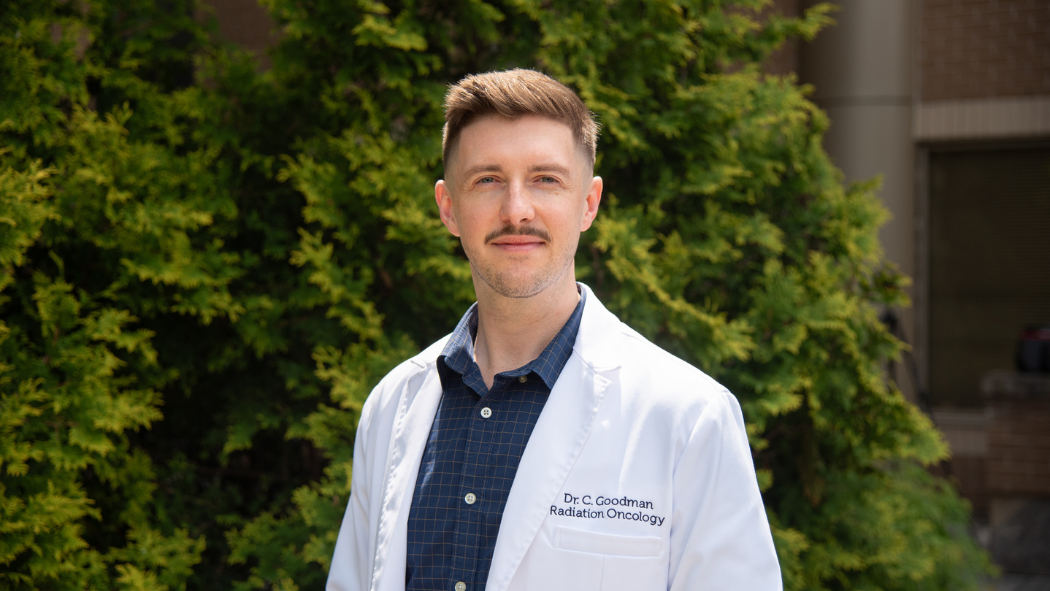
May 31, 2024
It is important to note that for many First Nations communities, tobacco is a gift given by the Creator, which is respected and honoured as part of traditional ways of being and knowing. It is grown and dried without any additives. It is used as a medicine to promote physical, spiritual, emotional and community wellbeing. It is not about consumption but rather about honoring its sacred role in cultural practices and healing rituals.
When discussing smoking and tobacco cessation, the conversation does not include its use as medicine for those First Nations communities.
Dr. Chris Goodman MD FRCPC, Radiation Oncologist at the Verspeeten Family Cancer Centre at London Health Sciences Centre (LHSC) treats head and neck, as well as thoracic cancers. These tumor sites are quite commonly impacted by smoking.
“The negative health impacts from smoking cigarettes are well known yet most find it difficult to stop. When I work with patients who smoke, I want to normalize how common it is to struggle with quitting,” Dr. Goodman says.
“Society’s views towards smoking have changed over the years, and there is now a stigma attached to it. This can often lead to people wrestling with their addiction in isolation,” explains Dr. Goodman. “I recognize that when patients come to me, they’re in a vulnerable place and wonder why they should quit now after already developing cancer.”
Smoking is estimated to cause about 30 per cent of all cancer deaths and up to 80 per cent of lung cancer cases. It also increases the risk of other tumors like head and neck or bladder cancers. Besides cancer, smoking can cause many other illnesses and damages almost every organ in the body. “Even without a cancer diagnosis, quitting smoking is one of the best things you can do to decrease your risk of health problems down the road,” explains Dr. Goodman.
Quitting smoking after a cancer diagnosis
In Ontario, about one in six new cancer patients are current or recent tobacco users.
Quitting smoking after a cancer diagnosis has several benefits from short to long term:
- improves your cough;
- lowers risk of developing a second cancer;
- improved treatment outcomes for radiation therapy, chemotherapy and surgery; and
- decreases the risk of further complications.
Smoking cessation is incredibly important for patients receiving cancer treatment. “For example, if you quit smoking before starting radiation therapy, your body receives more oxygen. Radiation targets cancer cells partly through its interaction with oxygen molecules so smoking cessation improves the efficacy of radiation treatment” says Dr. Goodman. “Quitting smoking not only enables a person to better handle treatment, but it improves the outcome of cancer treatments and decreases the risk of further health complications.”
Chewing tobacco, cigars and pipe smoking all come with the same risks as smoking cigarettes. “I often have patients tell me that they use other forms of tobacco and didn't think they had the same negative health effects as cigarettes. Any exposure to tobacco increases cancer risk,” Dr. Goodman says.
There is an acknowledgement that smoking is addictive, and addiction is a disease. People need to want to quit and often it can take multiple times before it sticks.
“We are all products of our environment and when behaviours, like smoking, are normalized, we tend to pick them up ourselves,” explains Dr. Goodman. “There is a recognition that we are all trying to cope with stress and anxiety in our daily lives. I ask patients what sorts of situations or moods trigger their urge to smoke and explore ways to minimize the impact of these situations on their efforts to quit. Identifying and working to correct negative psychological patterns is a major component of durable smoking cessation. Most people need multiple attempts before they can move on from smoking – and that’s okay. What’s most important is taking that first step.”
More information about smoking cessation
There are several different supports available to quit smoking. You can speak with your primary care provider, specialist or contact Health 811 (formerly Telehealth Ontario).
Health 811 provides help over the phone through a quit coach. Call a quit coach by dialing 811 (TTY” 1-866-797-0007).
For Indigenous-tailored smoking cessation support, you can access Talk Tobacco.
Visit the LHSC website for more smoking cessation resource information.
